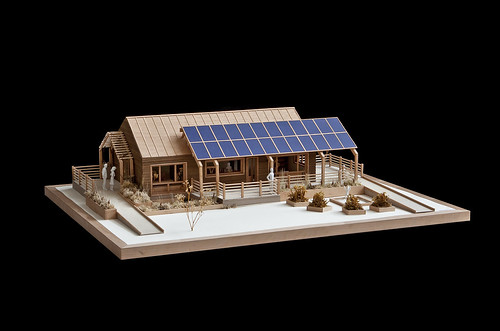If a business/home runs solely on solar power, what happens to electric bills?

Image by Dept of Energy Solar Decathlon
Team Massachusetts displayed their Solar Decathlon 2011 Design Development Model at the International Builders’ Show in Orlando, Florida from January 12-15, 2011. (Credit: All Commercial Photography/U.S. Department of Energy Solar Decathlon)
Question by Renee Josephine: If a business/home runs solely on solar power, what happens to electric bills?
If it ran on 100% solar power, would the business/home ever have to use business from an electric company? Could it eliminate power bills completely? Thanks.
Feel free to answer in the comment section below

If your home/business electricity needs can be filled 100% by solar, you will never pay the electric company again.
Practically the way it works, thanks to a law passed several years ago, you have the right to generate your own power and put all “excess” power back on the power grid and the utility company has to purchase it back from you at their residential rates. So, if your solar power system generates more power than you actually consume you can actually get money back from the utility.
Science Guy
March 5, 2012 at 11:19 pm
If they have the power co disconnect them from the network, no bills, but then you need a honking big battery to work at night. Most stay connected, used the net at night and pay a minimum fee, mostly just for bookkeeping. Some power co will put in two meters and pay you for the amount that your cells produce over what you use and goes into the network, but then they charge you a fee for the meter reader to read two meters.
vann_robert
March 5, 2012 at 11:39 pm
There’s two main types of solar power connection; off grid and grid connect.
In the off grid scenario, it’s stand alone – totally disconnected from the mains power grid and surplus power generated is stored in a bank of deep cycle batteries. This is the more expensive option, but totally separates you from the power company, so no more bills.
A grid connect setup is where you are still hooked into the mains grid and any excess power generated is fed back into the grid. The surplus is either treated as a credit on your bill or some electricity companies will pay you over and above the market rate for electricity. This arrangement is called a feed in tariff. There are two types of feed in tariffs:
Net feed in tariff : Whereby the company pays X amount for only the surplus energy you generate
Gross feed in tariff: Where the company pays X amount for all electricity you generate; usually well over the going market rate for electricity.
The gross feed in tariff model is one where you can actually make money on having a solar power system installed.
Germany implemented a gross feed in tariff that was around 4 times the market rate some years ago and it contributed greatly to the growth of the solar industry in that country. There’s a big push in Australia for a gross feed in tariff now, with Western Australia likely to see it implemented soon.
Most states only have a net feed in tariff in place and the rates aren’t all that attractive; however, depending on the way you use electricity and the various government rebates now available; the payback time on a system can be greatly reduced and you can get yourself into a situation whereby you are effectively paying $ 0 for electricity much more quickly.
mbttb
March 6, 2012 at 12:29 am
Think about it – SOLAR – SUN power – insufficient sunlight means no power! Suppose it was overcast for several days would your batteries be sufficient to power your business? No sunshine at night time unless you are above the Arctic Circle and then you have to have clear days!
I think you would have to have some sort of electricity back up just to keep your business running.
At the very least if you are still connected to the national grid you would have to pay the minimum price. If you had insufficient power to run your business would you make more money or lose more money getting your power from the electric company?
karazyal
March 6, 2012 at 12:55 am
There are several ways to use solar. My system is hooked to the grid, In the summer it generates more than 75% of my electricity when I’m generating more than I can use my meter runs backwards and I am selling back my excess, at night when I’m not generating my meter runs backwards. This months bill should be about $ 25.
I could have purchased a larger system that would zero out my bill while still hooked to the grid, some utilities will actually pay you if you generate more than you use.
Another option is to have a large system with a battery storage system. With this option you can choose to be connected to the grid or not. If you disconnect from the grid you should have no bill from the electric company however you also won’t have any back up incase of system problems. If you stay on the grid but use no electricity you still may have a small charge for regulatory fees or things of that nature.
Larry Hagman has such a large system he actually allows the utility to give his excess to a couple low income families.
whsgreenmom
March 6, 2012 at 1:49 am